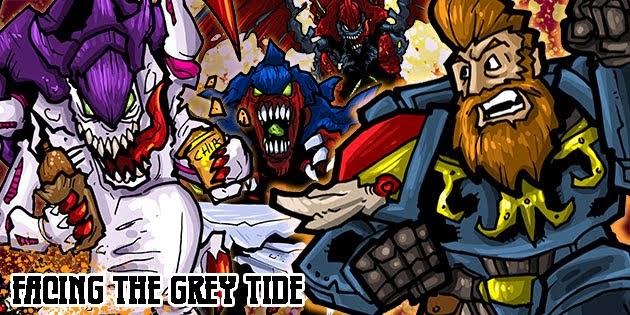The first entry in the Horus Heresy from Aaron Dembski-Bowden is the story of the architects of the Horus Heresy: the Word Bearer Legion. Continuing the Horus Heresy Review Series, this novel gets back to some of the main action of the Heresy. As with the recent reviews, following the jump, there will be spoilers.
The novel begins with the Emperor's censure of the Word Bearers, executed by the Ultramarines destroying the main cities of the world of Khur, one of the Word Bearer's prized triumphs. The people of Khur are punished for the Word Bearers' worship of the Emperor as a god, a creed expressly forbidden by the Imperial Truth.
As Lorgar is mourning his failure and embarrassment, his two most trusted advisers, Kor Phaeron and Erebus, begin guiding him to heresy and the Chaos powers. At this point in the book, it's very subtle, but there are definite indications that Kor Phaeron and Erebus have already fallen. They are the primary parties maneuvering Lorgar to follow the hints of the "old beliefs" for indications of a divine truth.
I really liked this scene as it remained fairly subtle, but for those who know what to look for, it's fairly clear that this discussion was planned by Erebus and Kor Phaeron. With the title being The First Heretic, I found myself wondering which of the two was the true architect of the Heresy. In previous books it had seemed to be Erebus was doing much of the manipulating, but there is the hint that Kor Phaeron may be the true mastermind.
If there was any doubt following this closeted scene, the events at the end of the book paint a clear picture of Erebus and Kor Phaeron's true feelings for their Primarch. On the battlefields of Istvaan V, the two berrate Lorgar for not having the true will to go through with the heresy, now that Lorgar can clearly see the scope of what has been wrought.
The book primarily follows Argel Tal, the moral voice of the book. Despite his morality, he still falls because of his devotion. He seems the most likely to resist, but he is sent into the Eye of Terror in the company of a daemon and duly possessed. Arel Tal and his warriors who are possessed barely survive the experience (many do not) and on their emergence, are named the Gal Vorbak, the Chosen.
While Argel Tal is doubtful of what the daemon tells him, the number of visions become somewhat convincing, and paired with the orders by his Primarch, he has little choice but to submit to the Chaos powers.
Argel Tal's story arc is interesting because it paints a picture of how a moral member of a legion can fall. Even on Istvaan V, we see that his loyalty is balanced on a knife's edge, but the momentum of previous actions and his inherent loyalty prevents him from rejecting orders and standing with the loyalists.
The climax scene of the book, which is largely the Massacre on Istvaan V, we get some glimpses of other primarchs as well when Lorgar rejects the "suggestions" of Erebus and Kor Phaeron and engages Corax to save his men, who were being destroyed by the Primarch. Lorgar survives the encounter only through the intervention of Kurze, though we get the indication that on some level, Lorgar meant to die, not wanting to live with the consequences of his Heresy.
The final parts of the book are also the first time we get to see members of the Night Lords legion. While grim and with a very dark background, they are revolted when they see Argel Tal's Chosen for what they truly are.
In the end, this novel was very interesting on a scene-by-scene basis as well as for its overarching background and view of the groundwork of the Horus Heresy. I find the ironies surrounding the Word Bearers pretty fascinating, and I think Dembski-Bowden did an excellent job of making them relatable, and more than the shadowy manipulator we've seen so far in Erebus. This book also makes me look poorly on the only other work so far to feature the Word Bearers - Battle for the Abyss.By comparison, the Word Bearers in that example are cartoonish and dull, featuring none of the character, charisma, or cunning displayed by each and every character in this novel.


No comments:
Post a Comment